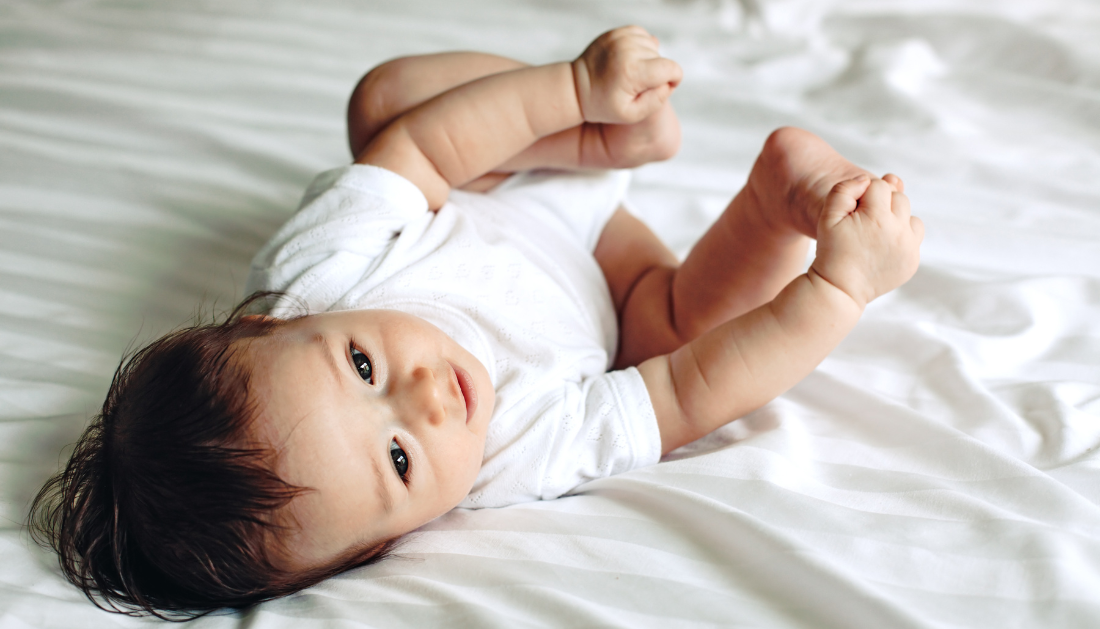

According to new research from the University of Birmingham, babies as young as four months old may understand how their bodies interact with the environment around them. The findings, published in Scientific Reports, give fresh light on how self-awareness develops.
Birmingham BabyLab experts showed babies a ball on a screen that moved towards or away from them. When the ball came closest to them on the screen, the babies were given a ‘touch’ (a little vibration) on their hands while their brain activity was monitored. The study’s data was gathered at Goldsmiths (University of London).
The researchers discovered that kids as young as four months old display increased somatosensory (tactile) brain activity when a touch is preceded by an object moving toward them.
Dr. Giulia Orioli, a Research Fellow in Psychology at the University of Birmingham who led the study, stated, “Our findings indicate that even in the first few months of life, before babies have even learned to reach for objects, the multisensory brain is wired up to make links between what babies see and what they feel.” This implies kids can perceive the space around them and understand how their bodies interact with it. This is known as peripersonal space.”
“Of course, humans do this all the time as adults, using our combined senses to perceive where we are in space and making predictions about whether or not we will touch an object.” But now that we know that kids in their early phases of development begin to exhibit symptoms of this, it raises the question of how much of these talents are acquired versus innate.”
The researchers also investigated how an unexpected’touch’ would effect some of the older babies in the study. They discovered that when the contact on their hand was preceded by the ball on the screen moving away from them, the newborns’ brain activity showed symptoms of surprise.
“Seeing the older babies show surprise responses suggests that they did not expect the touch due to the visual direction the object was moving in,” said Andrew Bremner, Professor of Developmental Psychology. This suggests that as babies progress through their first year of life, their brains develop a more sophisticated understanding of how their body occurs in the space around them.”
The researchers hope to expand this study with younger and older volunteers in the future. Adult studies can shed light on the types of brain activity that infants are developing. They also hope to investigate if there are any early indicators of these “multisensory” talents in newborn newborns.
Dr. Orioli concluded, “It is a challenge working with newborns because they spend so much of their time sleeping and eating, but we are starting to have some success working with this age group, and it will be fascinating to see if babies only a few days old have the foundations of a sense of their bodies in space.” If this is the case, we may be investigating the beginnings of human awareness.”
more recommended stories
 Microglia Neuroinflammation in Binge Drinking
Microglia Neuroinflammation in Binge DrinkingKey Takeaways (Quick Summary for HCPs).
 Precision Oncology with Personalized Cancer Drug Therapy
Precision Oncology with Personalized Cancer Drug TherapyKey Takeaways UC San Diego’s I-PREDICT.
 Iron Deficiency vs Iron Overload in Parkinson’s Disease
Iron Deficiency vs Iron Overload in Parkinson’s DiseaseKey Takeaways (Quick Summary for HCPs).
 Can Ketogenic Diets Help PCOS? Meta-Analysis Insights
Can Ketogenic Diets Help PCOS? Meta-Analysis InsightsKey Takeaways (Quick Summary) A Clinical.
 Silica Nanomatrix Boosts Dendritic Cell Cancer Therapy
Silica Nanomatrix Boosts Dendritic Cell Cancer TherapyKey Points Summary Researchers developed a.
 Vagus Nerve and Cardiac Aging: New Heart Study
Vagus Nerve and Cardiac Aging: New Heart StudyKey Takeaways for Healthcare Professionals Preserving.
 Cognitive Distraction From Conversation While Driving
Cognitive Distraction From Conversation While DrivingKey Takeaways (Quick Summary) Talking, not.
 Fat-Regulating Enzyme Offers New Target for Obesity
Fat-Regulating Enzyme Offers New Target for ObesityKey Highlights (Quick Summary) Researchers identified.
 Spatial Computing Explains How Brain Organizes Cognition
Spatial Computing Explains How Brain Organizes CognitionKey Takeaways (Quick Summary) MIT researchers.
 Gestational Diabetes Risk Identified by Blood Metabolites
Gestational Diabetes Risk Identified by Blood MetabolitesKey Takeaways (Quick Summary for Clinicians).

Leave a Comment